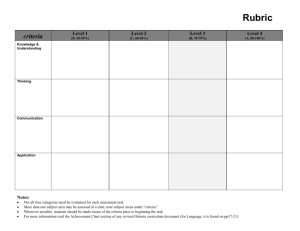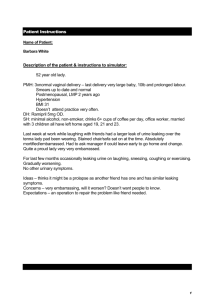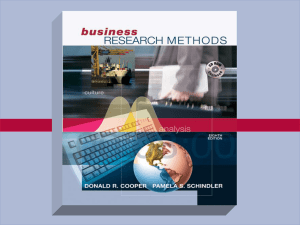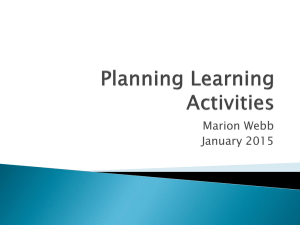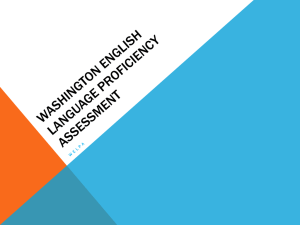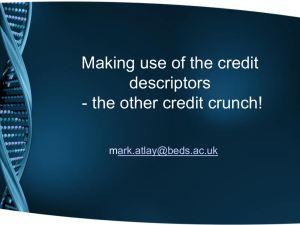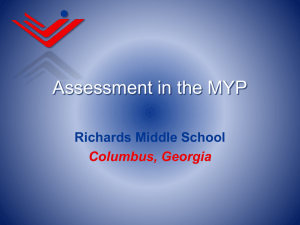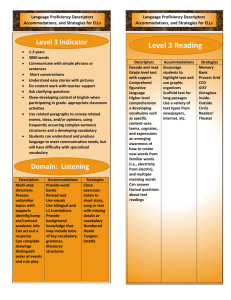What are Credit Level Descriptors?
advertisement
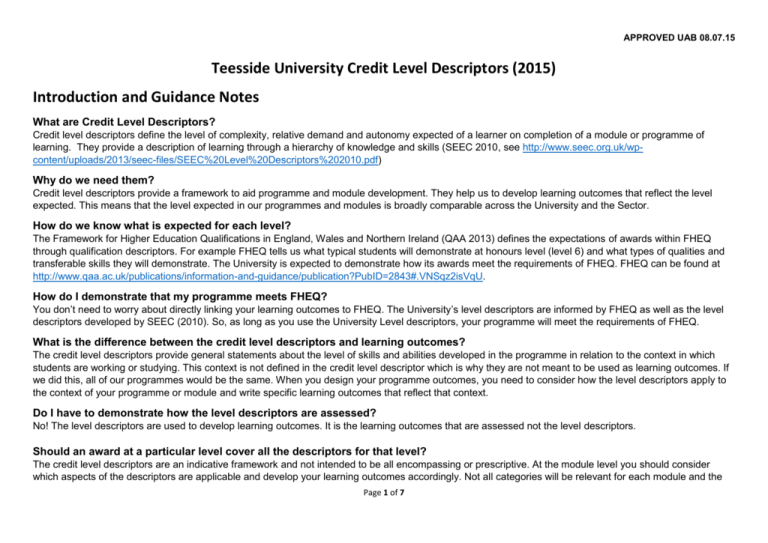
APPROVED UAB 08.07.15 Teesside University Credit Level Descriptors (2015) Introduction and Guidance Notes What are Credit Level Descriptors? Credit level descriptors define the level of complexity, relative demand and autonomy expected of a learner on completion of a module or programme of learning. They provide a description of learning through a hierarchy of knowledge and skills (SEEC 2010, see http://www.seec.org.uk/wpcontent/uploads/2013/seec-files/SEEC%20Level%20Descriptors%202010.pdf) Why do we need them? Credit level descriptors provide a framework to aid programme and module development. They help us to develop learning outcomes that reflect the level expected. This means that the level expected in our programmes and modules is broadly comparable across the University and the Sector. How do we know what is expected for each level? The Framework for Higher Education Qualifications in England, Wales and Northern Ireland (QAA 2013) defines the expectations of awards within FHEQ through qualification descriptors. For example FHEQ tells us what typical students will demonstrate at honours level (level 6) and what types of qualities and transferable skills they will demonstrate. The University is expected to demonstrate how its awards meet the requirements of FHEQ. FHEQ can be found at http://www.qaa.ac.uk/publications/information-and-guidance/publication?PubID=2843#.VNSqz2isVqU. How do I demonstrate that my programme meets FHEQ? You don’t need to worry about directly linking your learning outcomes to FHEQ. The University’s level descriptors are informed by FHEQ as well as the level descriptors developed by SEEC (2010). So, as long as you use the University Level descriptors, your programme will meet the requirements of FHEQ. What is the difference between the credit level descriptors and learning outcomes? The credit level descriptors provide general statements about the level of skills and abilities developed in the programme in relation to the context in which students are working or studying. This context is not defined in the credit level descriptor which is why they are not meant to be used as learning outcomes. If we did this, all of our programmes would be the same. When you design your programme outcomes, you need to consider how the level descriptors apply to the context of your programme or module and write specific learning outcomes that reflect that context. Do I have to demonstrate how the level descriptors are assessed? No! The level descriptors are used to develop learning outcomes. It is the learning outcomes that are assessed not the level descriptors. Should an award at a particular level cover all the descriptors for that level? The credit level descriptors are an indicative framework and not intended to be all encompassing or prescriptive. At the module level you should consider which aspects of the descriptors are applicable and develop your learning outcomes accordingly. Not all categories will be relevant for each module and the Page 1 of 7 emphasis will depend on the context and focus of the module. At the level of the award, there is an expectation that all categories of the level descriptors are used to develop your outcomes in a holistic way. Do I have to have a learning outcome for each level of the programme? No. Higher levels subsume the descriptors and outcomes at the lower level. I have some learning outcomes that could fit under more than one heading. Do I include them in more than one category? Depending on the focus of the programme, outcomes can be relevant to more than one category. For example, team working can occur in the context of a research team, as part of professional practice or in an academic module. Use your judgement in terms of where it is most relevant and just include it in that category. What else do I need to consider when developing learning outcomes? If your programme is accredited by a Professional Statutory Regulatory Body (PSRB) you will need to incorporate their requirements in your learning outcomes. The QAA also publishes a comprehensive range of subject benchmark statements for at honours level and also has some statements for masters’ level. These must also be considered when writing learning outcomes - see http://www.qaa.ac.uk/assuring-standards-and-quality/the-quality-code/subjectbenchmark-statements. Additionally the QAA has published Qualification Characteristics Statements describe the distinctive features of qualifications at a particular level within the Qualifications Frameworks. How do the level descriptors link to the LTSES? The LTSES states: ‘our goal is to educate our students in their chosen discipline to become: confident, critical, creative, adaptable, articulate, aspiring’. Although not all these key words may be reflected in the level descriptors it is possible to use the descriptors to show how the goal will be met within an individual course. For example: Being confident is implicit in many of the Personal and Transferable and Professional Skills descriptors in relation to being autonomous and effective Being critical is a feature of several Research, Knowledge and Cognitive Skills descriptors as well as a part of personal evaluation and development Being creative is a feature of research, enquiry and synthesis, decision making and performance Being adaptable to different contexts is a feature of several of the Personal and Transferable descriptors; Being articulate is a feature of interpersonal, communication and team working skills; Being aspiring is a feature of personal evaluation and being self critical, it is also a feature of Research, Knowledge and Cognitive Skills in being able to identify, develop and evaluate new approaches and ideas. Page 2 of 7 Teesside University Credit Level Descriptors (2015) Learning activities at the respective level of study are designed to enable students to: Personal and Transferable Skills Domain Personal evaluation and development Interpersonal and communication skills Level 3 Level 4 Articulate their individual capabilities against given criteria and engage in guided personal development activity. Articulate and evaluate own capabilities in key areas and engage in development activity through guided selfdirection. Use interpersonal and communication skills to clarify tasks and identify problems and communicate outcomes in narrowly defined contexts. Use interpersonal and communication skills to clarify tasks and identify and rectify issues in a range of contexts. Team and organisational working Recognise their own behaviour and adapt it to meet clearly defined obligations to others. Domain Level 3 Work effectively with others and recognise the factors that affect team performance. Level 4 Level 5 Assess individual capabilities using justifiable criteria set by self and others taking the wider needs of the context into account. Level 6 Level 7 Take responsibility for own learning and development using reflection and feedback to analyse own capabilities, appraise alternatives and plan and implement actions. Use personal reflection to analyse self and own actions. Make connections between known and unknown areas, to allow for adaptation and change. Independently and self critically develop own learning and reflect on own and others’ learning to improve practice. Adapt interpersonal and communication skills to a range of situations, audiences, and degrees of complexity. Set criteria for, and be effective in professional and interpersonal communication in a wide range of situations. Identify, evaluate and maintain capabilities and qualities to support effective communication in a range of complex and specialised contexts. Select relevant communication tools to communicate complex or contentious information that is relevant to the target audience. Interact effectively within a team, giving and receiving information and ideas and modifying responses where appropriate. Work effectively within a team, support or be proactive in leadership. Work effectively with multiple teams as leader or member. Lead or work effectively in multiple teams, with capacity to perform different roles. Recognise and ameliorate situations likely to lead to conflict. Negotiate in a professional context and manage conflict. Proactively seek to resolve conflict. Clarify tasks and make appropriate use of the capacities of team members resolving likely conflict situations before they arise. Use feedback to adapt own actions to reach a desired aim and review impact. Level 5 Page 3 of 7 Level 6 Level 7 Level 8 Manage capacities of others and is confident in negotiating and managing conflict. Level 8 Working in digital environments Understand digital environments and work responsibly with digital media Operate competently and responsibly in digital environments and use digital media effectively. Select appropriate digital tools to achieve outcomes and operate responsibly within digital environments Select from a wide range of digital media appropriate to the task and operate responsibly within digital environments Decision making Make sound decisions in defined contexts and articulate the basis for that decision. Understand competing perspectives that inform decisions and articulate reasoning for own decisions. Weigh competing perspectives and justify decisions and judgements. Page 4 of 7 Make evidence-based decisions in more complex situations and accept accountability for the outcome and impact of those decisions. Demonstrate a sophisticated understanding of a range of digital environments and the ability to operate responsibly within them. Use judgement to make evidence-based decisions within complex academic and/or professional contexts. Accept full accountability for the outcome and impact of those decisions. Demonstrate sophisticated understanding of a range of digital environments and model responsible use of digital environments. Operate as a decision maker in complex and unpredictable contexts and develop a strategic approach to delivering outcomes. Research, Knowledge and Cognitive Skills Domain Critical Thinking Level 3 Develop an understanding of defined areas of the knowledge base and to relate concepts to underlying theoretical frameworks. Research, enquiry and synthesis Carry out defined investigative strategies, to present findings in an appropriate format. Level 4 Develop a broader understanding of the knowledge base, to identify principles underlying theoretical frameworks and begin to identify their strengths and weaknesses. Identify a well-defined focus for enquiry and undertake investigative strategies using a defined range of methods. Collect information and data from a variety of sources and articulate findings in an appropriate format. Collect information from defined sources to inform a choice of solutions to standard problems in familiar contexts. Domain Level 3 Provide informed solutions to standard problems in familiar contexts. Level 4 Level 5 Level 6 Level 7 Level 8 Develop a deeper understanding of wellestablished theories and concepts and to identify, analyse and articulate principles and concepts whilst recognising competing perspectives. Work with and articulate abstract ideas, arguing from competing perspectives and to recognise the possibility of new concepts within existing knowledge frameworks. Use highly abstract ideas, to develop critical responses, to contemporary theoretical discourses and to articulate new approaches. Work at the forefront of the discipline, to develop and articulate highly abstract ideas, to develop new knowledge and contribute to the theoretical discourse. Confidently define research questions, select and use investigative strategies. Critically use appropriate theoretical research models to seek new information, recognising limitations of the enquiry. Design substantial investigations to address significant areas of theory and/or practice. . Critically analyse the outcomes and apply knowledge in unfamiliar contexts, synthesising information to create novel solutions. Explore data and identify patterns and relationships, collect and synthesise ideas to inform a choice of solutions to problems in unfamiliar contexts. Select appropriate advanced methodological approaches and critically evaluate their effectiveness Level 5 Level 6 Level 7 Page 5 of 7 Act independently and with originality in research to develop or adapt appropriate advanced methodological approaches. Level 8 Analysis and Evaluation Collate and articulate a range of information using pre-defined principles, techniques, frameworks and/or criteria. Analyse a range of information and to judge the reliability of data and information using pre-defined techniques and/or criteria. Analyse a range of information using appropriate subjectspecific techniques and to discriminate between the relative relevance and significance of data/evidence collected. Analyse new, novel and/or abstract data, comparing alternative methods and techniques. Judge the reliability and significance of evidence used to support conclusions and articulate explanations for contradictory data/results Analyse complex, incomplete or contradictory evidence/data and justify the enquiry methodologies used and recognise and argue for alternative approaches. Undertake independent critical analysis or evaluation, managing complexity, incompleteness of data or contradictions in areas of knowledge. Professional Skills For programmes with PSRB accreditation and/or specific professional requirements - level descriptors and outcomes under this heading should primarily be focused on meeting PSRB requirements and QAA subject benchmarks. For example a key descriptor could be: meet the professional requirements/competencies that enable registration. There may be other skills that are developed within a programme that need to be evidenced at an appropriate level, for example: Adaptation to context: adapt to a different variety of contexts with different levels of supervision/autonomy; Performance: perform tasks, techniques or processes with different levels of complexity; take different levels of responsibility for analysing/evaluating the performance of self (and others) based on different ranges of data/evidence; Ethical awareness and application: have different levels of awareness of professional ethical issues and professional codes of conduct have different levels of ability to manage ethical dilemmas and formulate solutions with others For programmes where there are no specific PSRB accreditation and/or specific professional requirements the following descriptors may be considered. Domain Level 3 Level 4 Level 5 Page 6 of 7 Level 6 Level 7 Level 8 Adaptations to context Undertake, under direction, a given and clearly defined role in predictable and defined contexts. Operate under supervision in a range of varied but predictable contexts. Adapt own performance in situations of varying complexity and predictability acting with limited supervision. Act with minimal supervision in complex and unpredictable contexts. Autonomously adapt own performance in complex and unpredictable contexts. Autonomously adapt own performance to work effectively in multiple contexts. Evaluate performance using a range of techniques and processes. Autonomously implement and evaluate improvements to performance drawing on innovative or best practice. Use initiative to perform with precision and effectiveness, taking responsibility for self and others to develop skills and procedures. Incorporate a critical ethical dimension to their practice managing the implications of ethical dilemmas, working proactively with others to formulate solutions. Analyses and manages ethical dilemmas, works proactively with others to formulate and implement solutions. Performance Undertake performance tasks that are unfamiliar. Reflect on performance tasks that may be complex and nonroutine. Analyse performance of self and others and suggest improvements. Be aware of ethical issues in relation to personal beliefs and values. Demonstrate awareness of personal responsibility in relation to ethical issues and professional codes of conduct. Ethical awareness and application Have an awareness of discipline specific ethical issues. Page 7 of 7 Incorporate personal responsibility and professional codes of conduct into their practice.
